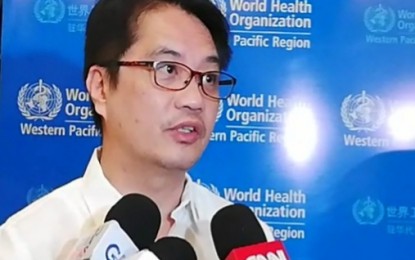
ADDRESSING POLIO. The Department of Health is working to address the open defecation problem amid the re-emergence of polio disease in the country, Undersecretary Eric Domingo says on the sidelines of a press conference in Manila on Thursday (Sept. 19, 2019). The zero open defecation program is one of the preventive measures against polio, a fatal and disabling disease that has re-emerged in the country. (PNA file photo)
MANILA -- The Department of Health (DOH) is working to address the open defecation problem, amid the re-emergence of polio disease in the country, a health official said Thursday.
“We're doing something about it. First of all, we want to identify funds, and we're working with other government agencies, just like what Senator (Cynthia) Villar said, with the Department of Public Works and Highways, which can construct septic tanks faster,” DOH Undersecretary Eric Domingo told reporters on the sidelines of a press conference in Manila.
During Tuesday's Senate subcommittee hearing on the proposed PHP160.15 billion budget of the DOH for 2020, Villar said the PHP2 million allocation to build sanitary toilets under Environmental and Occupational Health was not enough to address open defecation.
Villar said an estimated 700,000 households need adequate sanitary toilet facilities if at least 3.5 million Filipinos practice open defecation in Metro Manila.
Local government units have also been urged to achieve zero open defecation by putting up toilets to ensure sanitation and proper disposal of human wastes.
“Public toilets, open defecation is really a problem and polio is really one of the diseases that emerge when there's open defecation, and improper disposal contaminates the water supply. The DOH is checking how we can allocate this, together with the local government units to ensure reaching our zero defecation goals,” Domingo said.
Among the regions, the National Capital Region has the biggest number of households that lack toilets.
“Out of the 3.5 million toilets needed, majority of them are in the NCR. These are residential toilets because there are many families without sanitary toilets,” Domingo said.
The zero open defecation program is one of the preventive measures against polio, a fatal and disabling disease caused by the polio virus. It is transmitted through the fecal-oral-route where environmental sanitation and personal hygiene are poor.
Health Secretary Francisco Duque III said earlier that his department would intensify its vaccination campaign against polio.
He said polio is re-emerging in the country, 19 years after the Philippines has been declared polio-free by the World Health Organization in 2000. (PNA)
